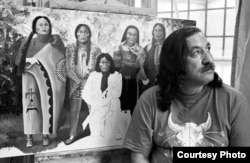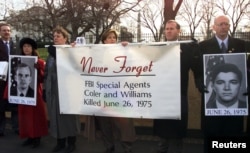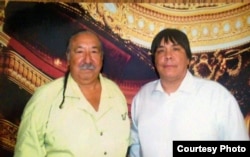Federal law enforcement calls him a remorseless killer who deserves to serve the rest of his life in prison. His supporters say he was framed for a crime he didn’t commit. Today, after 40 years in prison, Native American activist Leonard Peltier is in failing heath. His defenders have heightened calls for President Barack Obama to grant Peltier clemency before leaving the White House.
During the unrest of the 1970s, Peltier joined the American Indian Movement (AIM), an organization dedicated to protecting, preserving and defending treaty rights of tribal Americans. AIM’s reputation was tarnished by acts of violence, most notably the 1972 six-day takeover of the Bureau of Indian Affairs building in Washington, D.C.
In 1977, Peltier was convicted for the murders of FBI agents Jack Coler and Ron Williams during a 1975 standoff on South Dakota’s Pine Ridge Indian Reservation and sentenced to two consecutive life sentences. Since then, he has lost numerous appeals and has twice been denied parole.
Amnesty International USA has followed the case for years and supports Peltier’s request for executive clemency.
“We believe that the trial was influenced by the political issues of the time, but mainly we’ve been couching our language on this case specifically on the fair trial issue - that he should be released and granted a new trial or just released outright, based on the fact that he’s now spent over 40 years in detention based on these charges,” said Justin Mazzola, Amnesty USA’s deputy director of research.
“The reality is that Peltier’s over 70 years old,” said Mazzola. “He’s a diabetic. He’s had other health issues. He’s got an abdominal aortic aneurysm that’s really concerning. Any kind of rupture would be fatal.”
At issue is whether an alleged eyewitness to the shooting was coerced into saying she saw Peltier shoot the agents. Though she later retracted her testimony, she was not allowed to testify for the defense. Amnesty has also expressed concern over ballistics evidence presented during the trial.
Fair trial?
Peltier has always maintained his innocence. In his February 2016 petition for clemency, he called on Obama to evaluate his case “through today’s lens and worldview.”
“Justice has been served…and the time is right for law enforcement’s and the families’ interests to be balanced against important principles of justice, healing and reconciliation with America’s first peoples,” his appeal reads.
Peltier’s case has inspired books and films and gained him the support of rights groups, celebrities and public figures including Archbishop Emeritus Desmond Tutu.
The judge who originally convicted Peltier later came out in support of clemency, citing new evidence that would have changed his 1977 ruling.
But the federal law enforcement community expresses outrage over the clemency appeal.
“In well over a dozen appeals, twice reaching the U.S. Supreme Court, every aspect of Peltier’s trial has been reviewed in minute detail. Each time, Peltier’s conviction has been upheld,” said Thomas O’Connor, president of the FBI Agents Association, in a written statement to VOA.
“Peltier has never taken responsibility for his crimes while imprisoned. The families of Coler and Williams continue to suffer from the loss of their loved ones, and the FBI Agents Association will not allow Peltier’s legal and public relations team to portray him as anything other than who Peltier really is: an unremorseful, cold-blooded killer…President Obama should deny his petition for executive clemency,” he concluded.
Larry Langberg, president of the Society of Former Special Agents of the FBI, offered a similar statement:
“The evidence showed both agents were wounded and defenseless on the ground when Peltier and two other men walked down a hill toward the ambushed agents,” he wrote. “These horrific acts were an affront to society that have not diminished with time. Peltier remains unrepentant and repeatedly boasts about his murderous acts. He should be shown the same degree of mercy he gave Jack Coler and Ron Williams, and that should be none.”
Claims of Peltier boasting about the killing come from a witness, whose testimony was later questioned as possibly coerced.
Family cites hardship
Over the years, Peltier has been moved from one federal penitentiary to another. Currently, he is serving at the Coleman federal penitentiary in Florida, more than 2,000 miles from his home on North Dakota’s Turtle Mountain Chippewa Indian reservation.
“The last time I saw my dad was when he was at Leavenworth prison,” said daughter Kathy Peltier. Her father was transferred from that prison in 2005.
“Because he keeps on being moved farther and farther away from his family, it's hard to go visit him,” she said. “I try not to think about the injustice he has endured up to now.”
Amnesty’s Mazzola believes that at the very least, the government should transfer Peltier to an institution closer to home.
“Not only so that he could see his family, but also have access to his tribal leader and participate in Native American rituals that are part of his religion,” Mazzola said.
The International Leonard Peltier Defense Committee has designated December 4-10 as “Peltier Week” and is calling on supporters to converge on Washington, D.C. for a series of vigils, conferences and meetings with members of Congress.
Renewed calls for Peltier’s release coincide with the ongoing standoff between police and Native American protesters over construction of the Dakota Access Pipeline.
Native communities view both as a test of the U.S. government’s commitment to promoting and protecting the rights of its tribal citizens.







